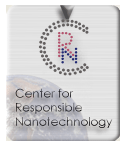














|
The next Industrial Revolution is right around the corner. Fourth generation nanotechnology — molecular manufacturing — will radically transform the world, and the people, of the early 21st century. Whether that transformation will be peaceful and beneficial or horrendously destructive is unknown. Although nanotechnology carries great promise, unwise or malicious use could seriously threaten the survival of the human race. The vision of CRN is a world in which molecular manufacturing is widely used for productive and beneficial purposes, and where dangerous uses are limited. CRN:Center for Responsible Nanotechnology (CRN) is a non-profit research and advocacy organization, completely dependent on small grants and individual contributions concerned with the major societal and environmental implications of advanced nanotechnology. We are a modern and networked collection of more than 100 volunteers, over 1000 interested followers and a team of primary coordinators. We are also independent, with no direct affiliation to any government, business, or academic organization. The mission of CRN:
The purpose of CRN is not to predict , but to prepare ; not to determine exactly when and how nanotechnology will enable disruptive molecular manufacturing, but to stimulate effective preparation for it, whenever and however it comes. Below are some of the pressing questions to which answers, planning and execution are required right away. Click to find out more information regarding each one and assist in the safe worldwide development of nanotechnology for everyone. Issues:What is nanotechnology?What are the benefits? What are the risks? Solutions:How soon do we need to prepare?Which restrictions will help - and which won't? How can opportunities be extended to all? Action:Join the conversation at CRNtalkSign up for the C-R-Network Support the work of CRN |
Inform your communities


Home | About Us | Donate | FAQ | Nano Tomorrows | CRN Blog | Site Map | Contact CRN
Last updated on